Choosing the right domain name extension for your website is an important decision that can impact your online presence and brand identity.
In this blog, you’ll explore important domain extensions.
After understanding those, it would be easy for you to decide domain extension.
But before domain extension, one term that often arises is “domain.” Let’s understand this first.
Table of Contents
ToggleWhat is a Domain?
In the realm of the Internet, a domain is a unique address that identifies a particular website.
The Structure of a Domain
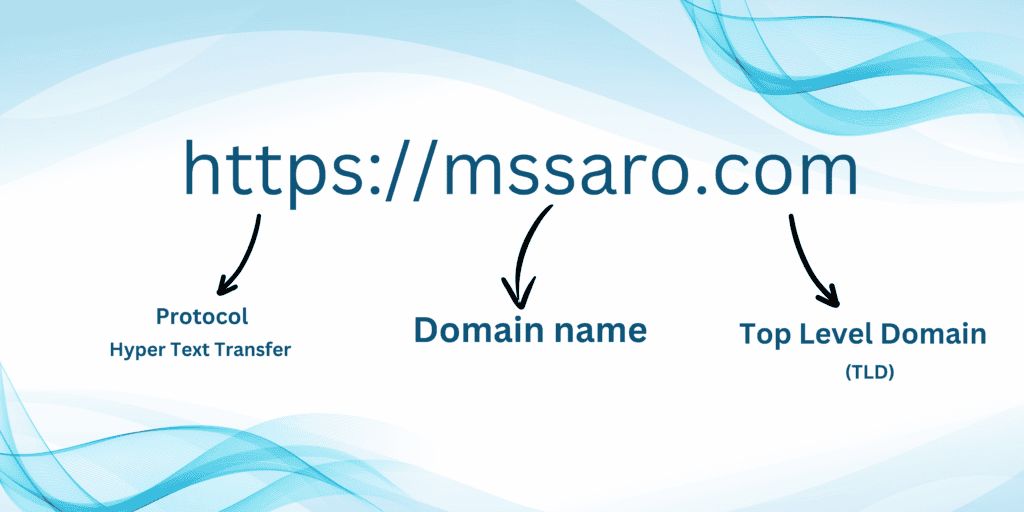
Any Domain name has 2 parts
Your Website Name (Domain name) + Domain name extension (TLD)
Domain Name Extension = Top Level Domain (TLD)
Example:
https://mssaro.com
Here mssaro is my website name (Domain)
And .com is my Domain extension
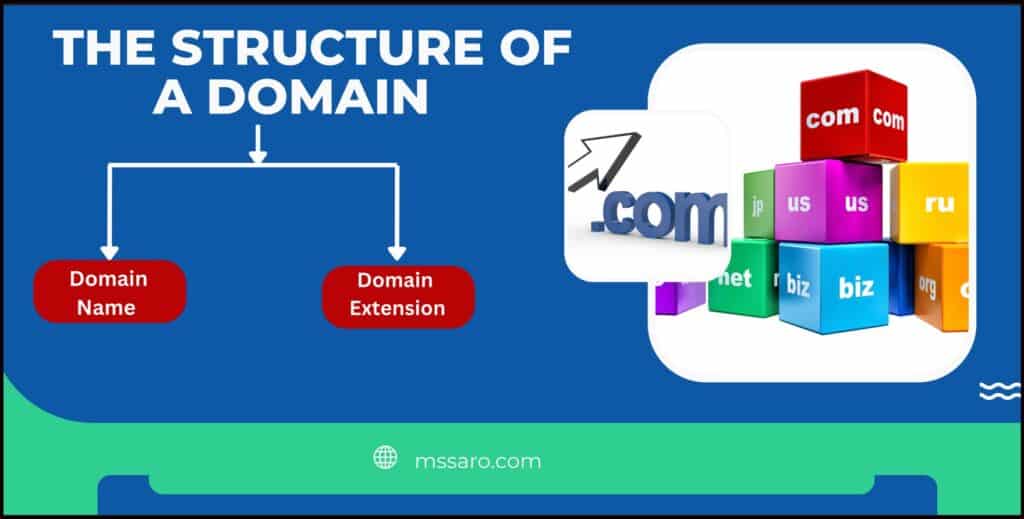
The domain extension (a top-level domain (TLD)), comes after the domain name and indicates the website’s purpose, location, or type (.com, .org, .net, etc.).
What are Domain Extensions?
Domain extensions play a crucial role in shaping online identities and defining the purpose of websites.
But what exactly are domain extensions, and how do they impact our online experience?
A domain extension, also known as a top-level domain (TLD), is the last segment of a domain name that follows the final dot.
Common examples of domain extensions include .com, .org, .net, and .edu.
Each extension serves a specific purpose, indicating the nature of the website or the type of organization it represents.
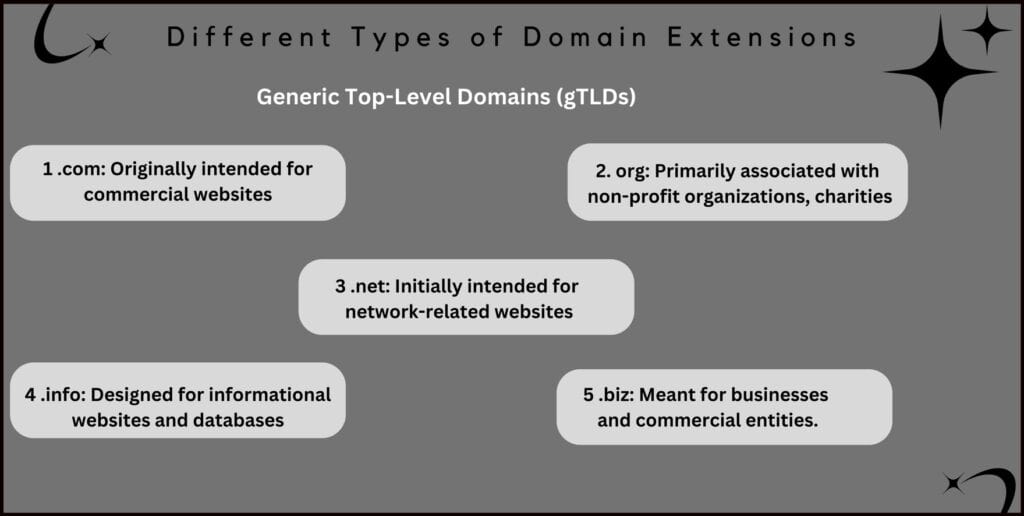
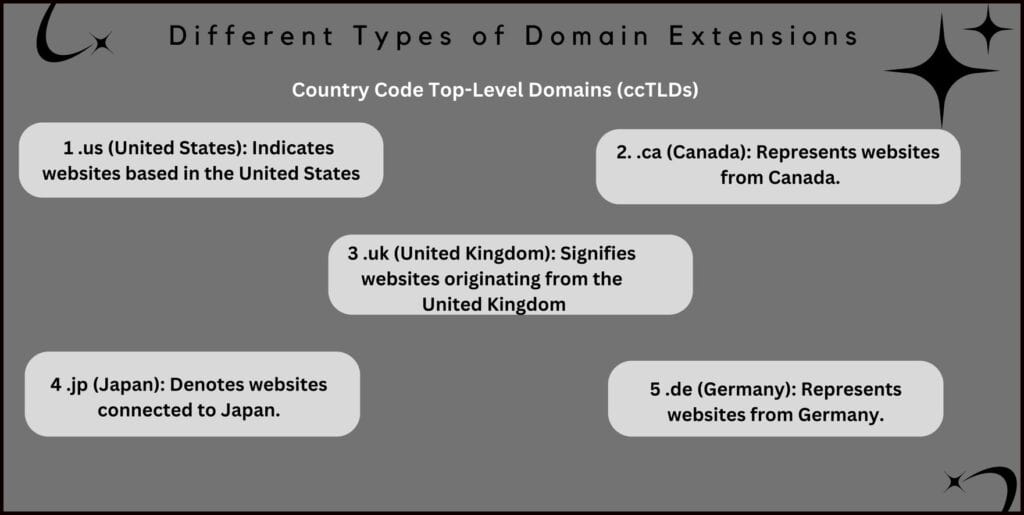
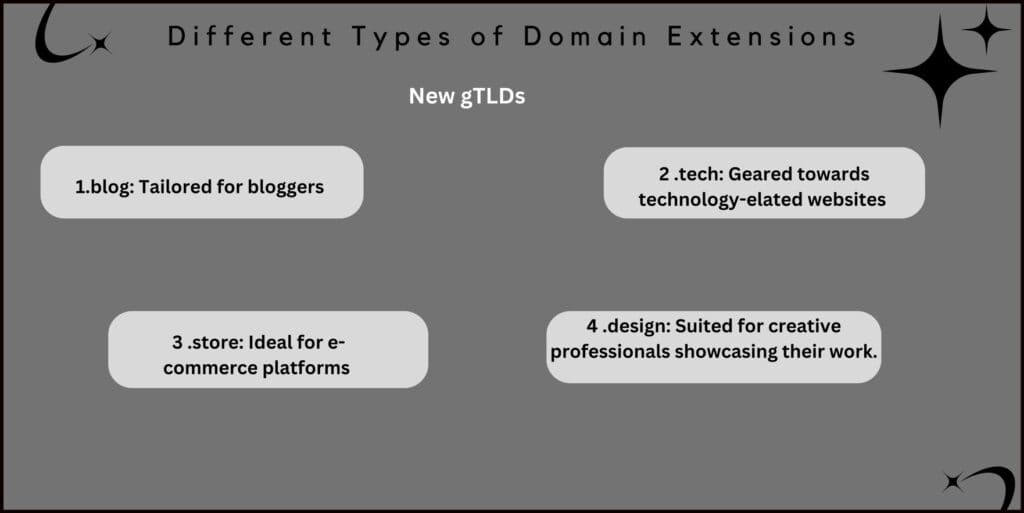
Who’s in Charge of Domain Extensions?
Who holds the power to regulate and distribute domain extensions?
The Internet Corporation for Assigned Names and Numbers (ICANN) is the primary organization responsible for managing domain extensions on a global scale.
ICANN oversees the coordination and distribution of domain names and IP addresses, ensuring their uniqueness and functionality across the Internet.
This non-profit organization plays a vital role in maintaining the Internet’s stability, security, and interoperability.
How to Choose the Right TLD for Your Website: Top Domain Name Extension List
Choosing the right domain name extension can be as important as selecting the name itself.
Let’s explore the top domain name extensions and help you decide which will work best for your needs.
1. Dot com (.com)
.com ——-> Commercial
Initially intended for commercial businesses.
Dot com (.com) is still the most popular and widely recognized domain name extension worldwide.
If you want to monetize your website, you should select this domain name extension.
2. Dot org (.org)
.org —> non-commercial purpose
The Dot org (.org) extension is traditionally associated with non-profit organizations.
If you’re in the healthcare, education, or charity sector, a .org extension may be a good choice.
3. Dot net (.net)
.net —> business in the technology industry
Dot net (.net) is a popular alternative to .com.
If you are doing some business in the technology industry, you can select this TLD for your website.
If your domain name is not available in .com, you can try this in .net.
4. Dot in (.in)
.in —-> country code domain
The Dot in (.in) extension is India’s top-level country code domain.
It’s a great option if you’re looking to target a domestic audience.
5. Dot icu (.icu)
Dot icu (.icu) stands for “I See You” and is a newer domain name extension.
It’s an excellent choice for businesses that want to create a unique online presence.
6. Dot xyz (.xyz)
Dot xyz (.xyz) is another newer domain name extension that is becoming increasingly popular.
It’s a good option for a short, memorable domain name.
It is an affordable alternative to .com/.org /.net
7. Dot club (.club)
If you’re running a membership organization or a sports team, .club is an excellent option.
It’s a fun and memorable extension that can help build community.
8. Dot cyou ( .cyou)
Dot cyou (.cyou) is another newer extension designed for businesses that want to create a unique online identity.
9. Dot sbs (.sbs)
Dot sbs (.sbs) stands for “Side By Side” and is an excellent choice for businesses focusing on collaboration and partnerships.
10. Dot link (.link)
If you want to create a link-sharing or bookmarking site, .link is the perfect choice.
11.Dot website (.website)
If you want a straightforward and easy-to-remember domain name, .website is an excellent option.
12. Dot top (.top)
Dot top (.top) is a newer domain name extension that is becoming increasingly popular.
It’s an excellent choice for businesses that want to stand out from the crowd.
13. Dot art (.art)
Dot art (.art) is perfect for businesses in the creative industry, such as artists, photographers, and designers.
14 .Dot click (.click)
If you’re running an ad campaign or an online marketing business, .click is the perfect choice.
15. Dot monster (.monster)
Dot monster (.monster) is a fun and memorable domain extension that’s perfect for companies in the entertainment or gaming industry.
16. Dot business (.business)
Dot business (.business) is an excellent choice for businesses in all sectors, as it’s straightforward to remember.
17. Dot beauty and dot makeup (.beauty and .makeup)
If you’re running a cosmetics or beauty products business, .beauty or .makeup can help attract the right audience.
18. Dot digital (.digital)
If you’re running a digital marketing or technology business, .digital is the perfect choice.
19. Dot live (.live)
If you want to create a streaming or live video content site, .live is the ideal choice.
20. Dot gifts (.gifts)
Dot gifts (.gifts) is an excellent choice for businesses selling gift items or creating a gift registry site.
What are the Primary Differences : .com, .net & .org Domain Names?
- Dot com (.com) was initially intended for commercial businesses, while .net was for network infrastructure companies, and Dot Org (.org) domains are typically linked to non-profit organizations, charities, and NGOs.
- Sometimes finding a domain name on .com is more difficult as it is a well-known and popular domain extension. In contrast, on .net, you can get a broader range of options from an available domain name that works well for your site.
- More than 45 % of the websites use a .com domain extension.
- .net TLD is the best alternative of .com TLD.
- The .net domain is the second most popular extension.
Which One Should You Choose( .com /.net/.org)?
Choosing between .com ,.net, and .org depends on your specific needs and goals.
The decision between .com and .net will come from availability and personal preference.
Let’s check each.
When Should You Choose a . Com Domain Name extension?
The most recognized and widely used domain extension is .com.
But when should you choose a .com domain name over other options? Here are a few things to consider:
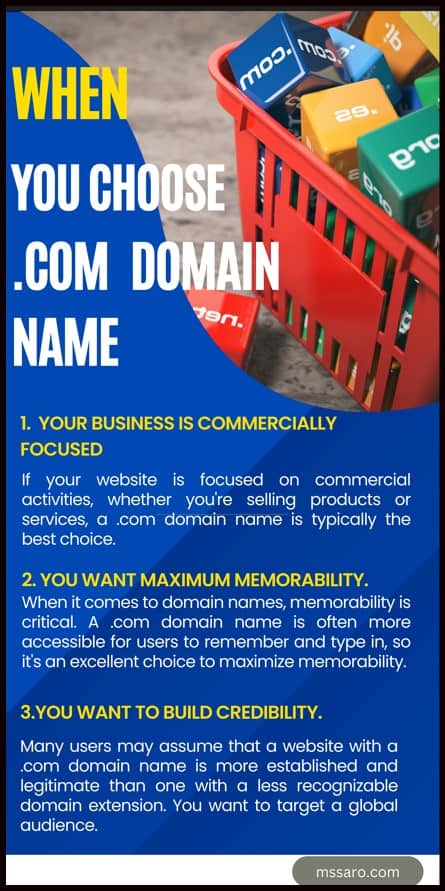
If you’re hoping to target a global audience with your website, a .com domain name is the best choice.
When Should You Use the .Net Domain Extension?
Let’s explore when you should use the .net domain extension.
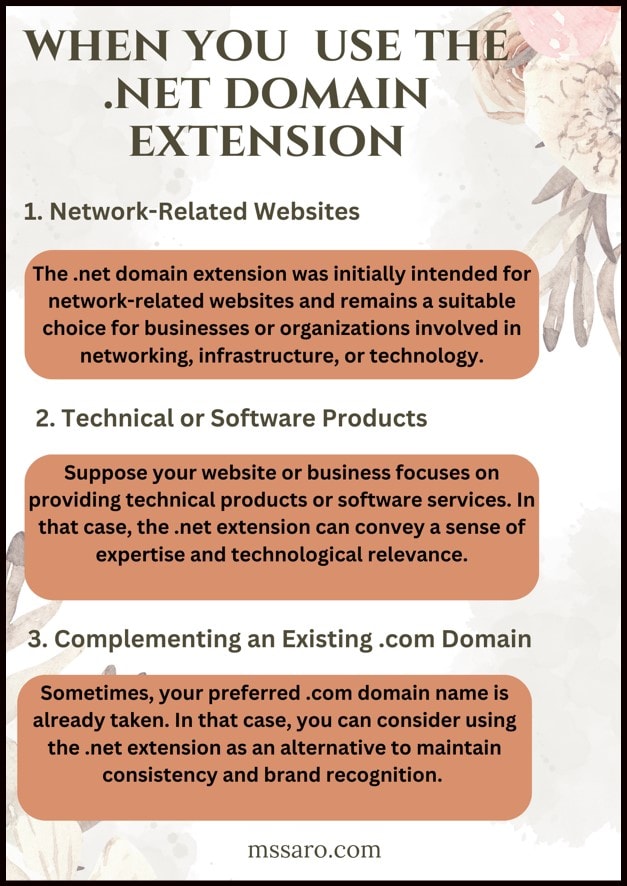
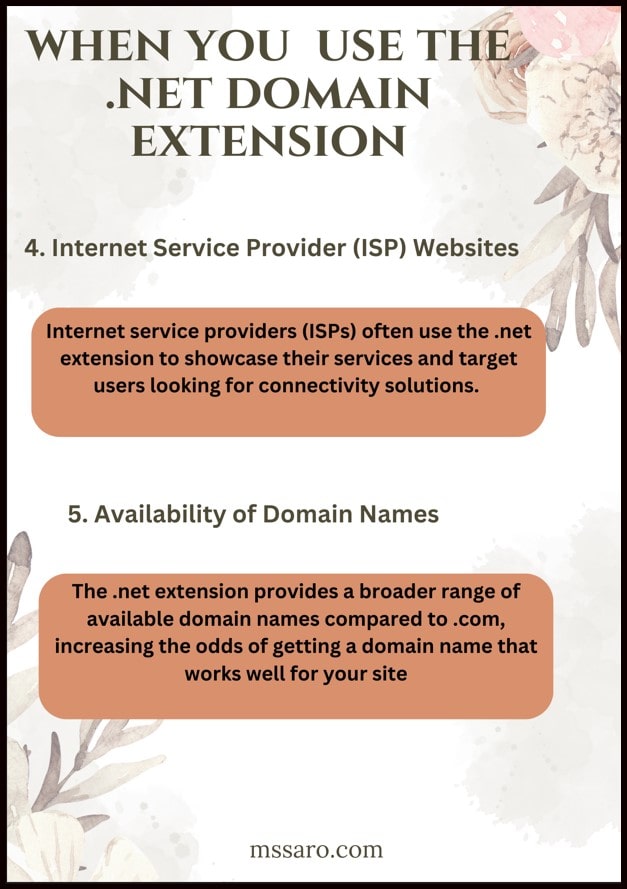
When Should You Use the .org Domain Extension?
Let’s check this.
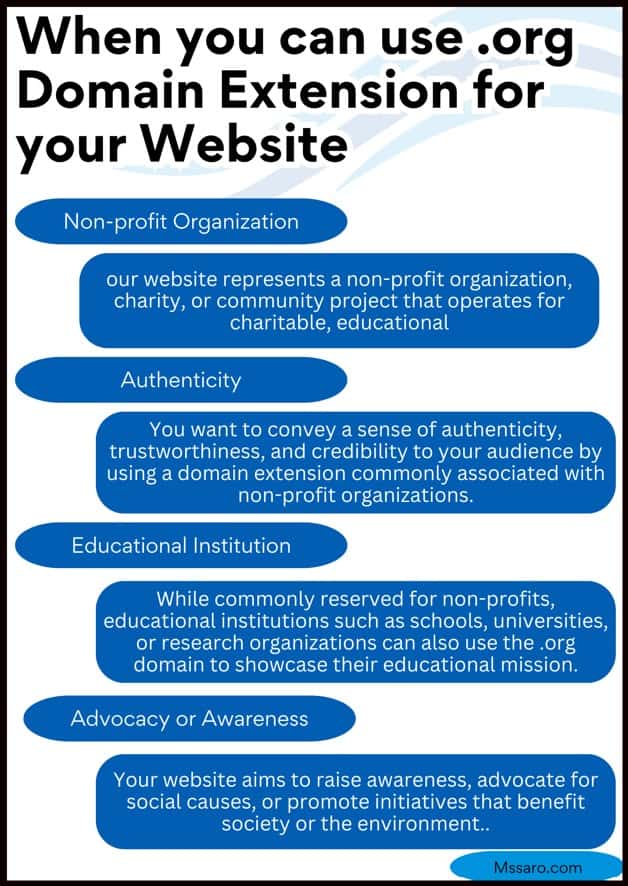
Which Domain Extension is better for SEO (.Com . Net . Org)
All three of them .com,.net and.org domain extensions are popular and widely recognized.
No conclusive evidence suggests that one is better than the other.
The choice of domain name extension is not a direct ranking factor in search engines.
Google has stated that they do not prioritize any domain extensions.
Tip:
A relevant and easy-to-remember domain name can help users remember a website and improve click-through rates(CTR), allowing traffic and backlinks.
Tips to Choose the Perfect Top-Level Domain Extensions
Here are some tips to help you select the most suitable TLD for your website:
You can select .com tld if anyway, you want to earn money from your website.
If Your website name (Domain name) is not available in .com , You can try this in .net tld
You can select .org If your website is related to nonprofit organizations or Education-related things.
Your TLD should reflect the purpose of your brand.
For Specific Industry, you can use a particular TLD, like .tech
If your website represents a specific country-related thing, you can use location-specific Tlds.
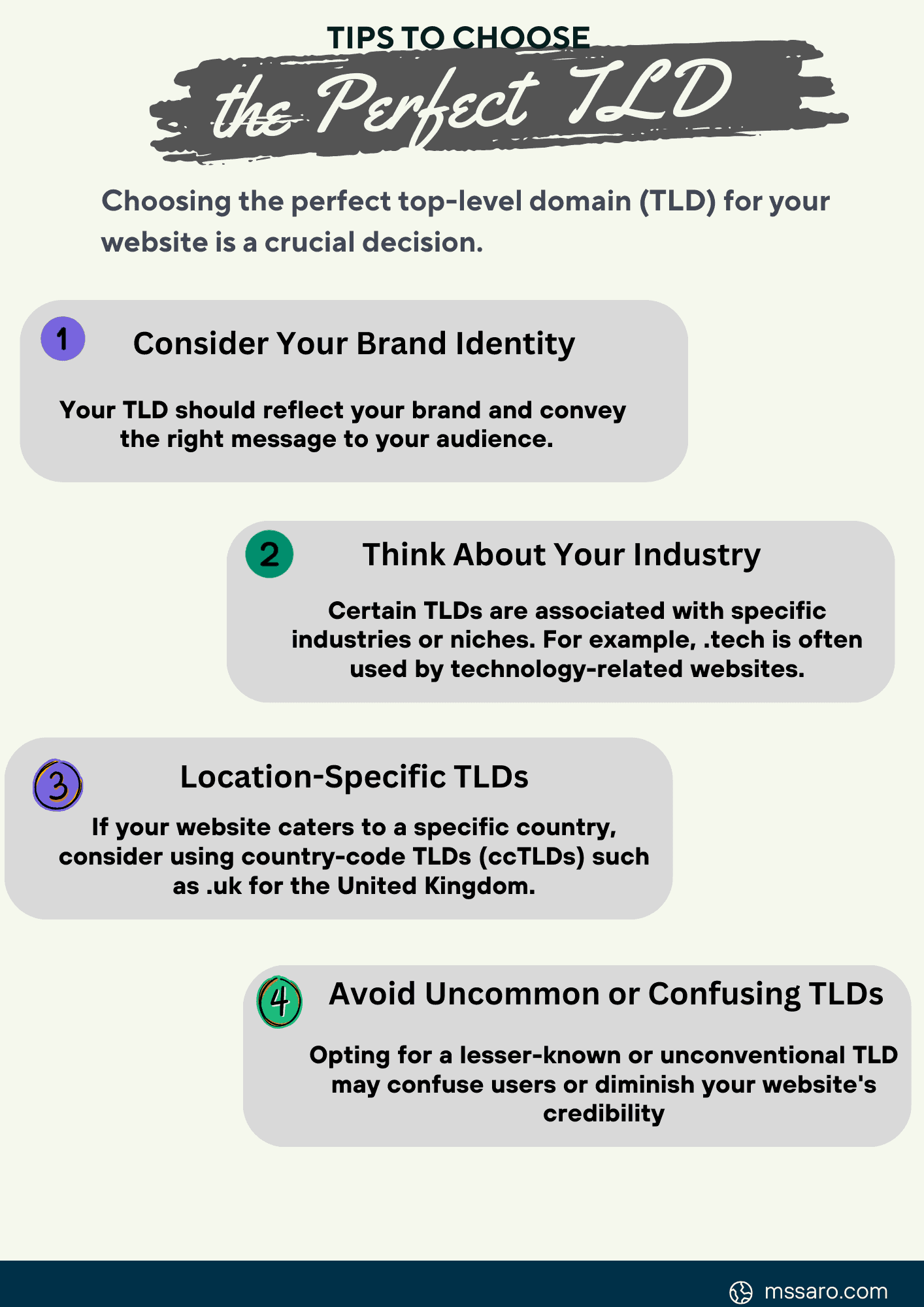
Can You Invent Your Domain Extension?
Common TLDs include .com, .org, and .net. However, many people wonder if inventing their own custom domain extension is possible.
Yes, it is possible through ICANN.
The Role of ICANN
The Internet Corporation for Assigned Names and Numbers (ICANN) regulates the introduction of new TLDs to ensure stability, security, and fairness in the domain name space.
In recent years, ICANN has allowed TLDs to expand beyond traditional options like .com or .org. With this introduction of new gTLDs, such as. tech, store has come up.
You can apply to ICANN to propose a unique TLD. If approved, they can become the registry operator for that TLD.
Conclusion
A domain extension is essential to a website’s identity and branding.
With the introduction of new generic top-level domains (gTLDs), a wide variety of domain extensions are available beyond traditional options like .com or .org.
Finally, a memorable domain name with a relevant, trustworthy, and recognizable TLD can contribute to the website’s overall credibility and user perception.
Keep Smiling and Start Sharing!!
What next?
What is Domain Name and How Does it Work.
Choose the best Domain name for your business.
Frequently Asked Questions(FAQ) About Domain Name Extensions (TLDs)
Answer: Creating an entirely new domain extension (TLD) independently is possible but it involves a complex process typically requiring collaboration with the Internet Corporation for Assigned Names and Numbers (ICANN) and existing domain registrars.
Answer: Some of the most common domain extensions include .com, .org, .net, and country-specific extensions such as .us, .uk, and .de.
Answer: When selecting a domain extension, consider the purpose of your website, your target audience, and the availability of your desired domain name.
Answer: The domain extension does not directly impact search engine optimization (SEO).
Answer: You can use domain registrar websites or domain search tools to check the availability of specific domain extensions.
Answer: Some domain extensions have restrictions on who can register them. For example, certain country-code TLDs (ccTLDs) may have residency or business presence requirements. It’s essential to review the registration requirements for each extension.
Answer: In most cases, changing the domain extension of an existing domain name is not possible.





